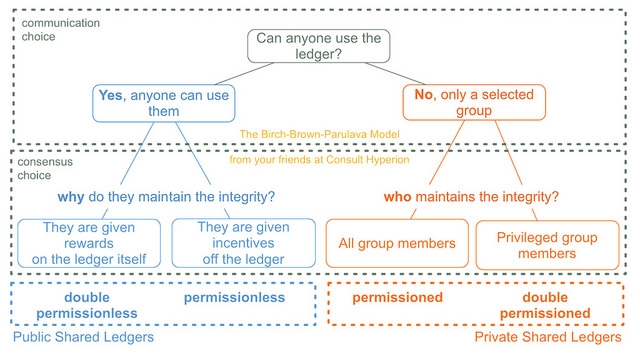Well, the paper that Richard Brown of R3, my colleague Salome Parulava and I put together what seems like an age ago (a year is a long time in fintech) has finally been published! Hurrah! Here’s the reference for you:
Birch, D., R. Brown and S. Parulava. Towards ambient accountability in financial services: shared ledgers, translucent transactions and the legacy of the great financial crisis. Journal of Payment Strategy and Systems* 10(2): 118-131 (2016).
The paper itself is not online (you have to subscribe to the Journal for that) but I’m sure that the fine people from Henry Stewart Publications will have no objection to me reproducing the abstract for you here:
"The consensus in the finance sector seems to be that the shared ledger technology behind Bitcoin, the blockchain, will disrupt the sector, although many commentators are not at all clear how (or, indeed, why). The blockchain is, however, only one kind of shared ledger and the Bitcoin blockchain works in a very specific way. This may not be the best way to organise shared ledgers for disruptive innovation in financial services. So what is? And why would financial services organisations want to do exploit it?"
"This paper sets out a simple shared ledger taxonomy and layered architecture designed to facilitate communication between technologists, businesses and regulators in the financial services world and explains why the various forms of shared ledgers might be attractive to financial services organisations, borrowing the phrase “ambient accountability” from architecture to suggest a new way to organise a financial sector."
The paper sets out the “4x4” model that we have used for exploring shared ledger technology with a variety of clients (and have found it to be a very useful tool to help clients develop their strategies around shared ledgers) and then uses this model to discuss the application of shared ledgers to financial services.
Birch, D., R. Brown and S. Parulava. Towards ambient accountability in financial services: shared ledgers, translucent transactions and the legacy of the great financial crisis. Journal of Payment Strategy and Systems* 10(2): 118-131 (2016).
The paper itself is not online (you have to subscribe to the Journal for that) but I’m sure that the fine people from Henry Stewart Publications will have no objection to me reproducing the abstract for you here:
"The consensus in the finance sector seems to be that the shared ledger technology behind Bitcoin, the blockchain, will disrupt the sector, although many commentators are not at all clear how (or, indeed, why). The blockchain is, however, only one kind of shared ledger and the Bitcoin blockchain works in a very specific way. This may not be the best way to organise shared ledgers for disruptive innovation in financial services. So what is? And why would financial services organisations want to do exploit it?"
"This paper sets out a simple shared ledger taxonomy and layered architecture designed to facilitate communication between technologists, businesses and regulators in the financial services world and explains why the various forms of shared ledgers might be attractive to financial services organisations, borrowing the phrase “ambient accountability” from architecture to suggest a new way to organise a financial sector."
The paper sets out the “4x4” model that we have used for exploring shared ledger technology with a variety of clients (and have found it to be a very useful tool to help clients develop their strategies around shared ledgers) and then uses this model to discuss the application of shared ledgers to financial services.

We finish by putting forward the idea that the legacy of the great financial crisis of the last decade might be the creation of more transparent financial markets. Our focus on transparency was reinforced by the discussions at Money 2020 in Copenhagen, where I think I detected the emergence of “regtech” as a distinct from “fintech” as a paradigm and organising principle. I spoke to a few people about this during the course of those sessions and it seems to me that for many of the financial services delegates their number one problem, the place where costs are out of control and apparently growing without limit, is compliance not technology. Yes, there is great new technology out there but it can’t help unless it has a regulatory context in which to flourish. The idea that there might be new categories of technology (and actually I think that the shared ledger might be one of them because of its potential for a new kind of transparency and a regulatory win-win) where the impact is to reduce the cost of complying with regulation rather than to reduce the cost of delivering a functional service sounds is potentially revolutionary.
What would transparency mean in our context? We envisaged a new kind of financial marketplace where “translucent” transactions that are clear to counterparts, clear in outline to regulators and opaque to others might allow us to set up a transactional environment with ambient accountability. We use the “glass bank” example to create a narrative, and it’s an example that I’ve used before to illustrate the relationship between transparency and trust. Here’s something about it from six years ago:
" Transparency increases confidence and trust. I often use a story from the August 1931 edition of Popular Mechanics to illustrate this point."
The legacy of a crisis is often regulation. If we view the shared ledger not only as a fintech (a technology that changes the cost/benefit landscape around financial services) but also as a regtech (a technology that changes the cost/benefit landscape around the regulation of financial services) then we might be able to make the legacy of the last crisis a better and more effectively regulated financial services sector that is a platform for radically new products and services. At a time when so much money is going on compliance and so much momentum is going into “legacy” regtech we realise that the use of shared ledgers may seem radical, but we are convinced that it is time for a new approach.
* http://www.henrystewartpublications.com/jpss
Dave Birch
David G.W Birch is Director of Consult Hyperion, the secure electronic transactions consultancy. He is an internationally-recognised thought leader in digital identity and digital money; named one of the global top 15 favourite sources of business information (Wired magazine) and one of the top ten most influential voices in banking (Financial Brand); listed in the top 10 Twitter accounts followed by innovators, along with Bill Gates and Richard Branson (PR Daily); named one of the "Fintech Titans" (NextBank), voted one of the European “Power 50” people in digital financial services (FinTech Awards) and ranked Europe’s most influential commentator on emerging payments (Total Payments magazine).
www.chyp.com
What would transparency mean in our context? We envisaged a new kind of financial marketplace where “translucent” transactions that are clear to counterparts, clear in outline to regulators and opaque to others might allow us to set up a transactional environment with ambient accountability. We use the “glass bank” example to create a narrative, and it’s an example that I’ve used before to illustrate the relationship between transparency and trust. Here’s something about it from six years ago:
" Transparency increases confidence and trust. I often use a story from the August 1931 edition of Popular Mechanics to illustrate this point."
The legacy of a crisis is often regulation. If we view the shared ledger not only as a fintech (a technology that changes the cost/benefit landscape around financial services) but also as a regtech (a technology that changes the cost/benefit landscape around the regulation of financial services) then we might be able to make the legacy of the last crisis a better and more effectively regulated financial services sector that is a platform for radically new products and services. At a time when so much money is going on compliance and so much momentum is going into “legacy” regtech we realise that the use of shared ledgers may seem radical, but we are convinced that it is time for a new approach.
* http://www.henrystewartpublications.com/jpss
Dave Birch
David G.W Birch is Director of Consult Hyperion, the secure electronic transactions consultancy. He is an internationally-recognised thought leader in digital identity and digital money; named one of the global top 15 favourite sources of business information (Wired magazine) and one of the top ten most influential voices in banking (Financial Brand); listed in the top 10 Twitter accounts followed by innovators, along with Bill Gates and Richard Branson (PR Daily); named one of the "Fintech Titans" (NextBank), voted one of the European “Power 50” people in digital financial services (FinTech Awards) and ranked Europe’s most influential commentator on emerging payments (Total Payments magazine).
www.chyp.com
Retrouvez tous les articles dédiés blockchain & distributed ledger technology dans votre nouveau quotidien Blockchain Daily News
Participez aux prochaines conférences Blockchain éditées par Finyear Group :
Blockchain Vision #5 + Blockchain Pitch Day #2 (20 septembre 2016)
Blockchain Hackathon #1 (fin 2016).
Participez aux prochaines conférences Blockchain éditées par Finyear Group :
Blockchain Vision #5 + Blockchain Pitch Day #2 (20 septembre 2016)
Blockchain Hackathon #1 (fin 2016).
Les médias du groupe Finyear
Lisez gratuitement :
Le quotidien Finyear :
- Finyear Quotidien
La newsletter quotidienne :
- Finyear Newsletter
Recevez chaque matin par mail la newsletter Finyear, une sélection quotidienne des meilleures infos et expertises en Finance innovation, Blockchain révolution & Digital transformation.
Les 6 lettres mensuelles digitales :
- Le Directeur Financier
- Le Trésorier
- Le Credit Manager
- The Chief FinTech Officer
- The Chief Blockchain Officer
- The Chief Digital Officer
Le magazine trimestriel digital :
- Finyear Magazine
Un seul formulaire d'abonnement pour recevoir un avis de publication pour une ou plusieurs lettres
Le quotidien Finyear :
- Finyear Quotidien
La newsletter quotidienne :
- Finyear Newsletter
Recevez chaque matin par mail la newsletter Finyear, une sélection quotidienne des meilleures infos et expertises en Finance innovation, Blockchain révolution & Digital transformation.
Les 6 lettres mensuelles digitales :
- Le Directeur Financier
- Le Trésorier
- Le Credit Manager
- The Chief FinTech Officer
- The Chief Blockchain Officer
- The Chief Digital Officer
Le magazine trimestriel digital :
- Finyear Magazine
Un seul formulaire d'abonnement pour recevoir un avis de publication pour une ou plusieurs lettres
Autres articles
-
NFT Factory s'envisage en mode itinérant avant de se ré-ancrer au coeur de la capitale
-
La startup française, Multis s'abrite désormais au sein de l'entreprise suisse, Safe,
-
La Paris Blockchain Week. Le bilan de l'événement qui met en lumière les innovations et les progrès réalisés par le Web3
-
Hong Kong : bientôt des premiers ETF Bitcoin ?
-
Monad Labs, un tour de table à 225 millions de dollars mené par Paradigm

















